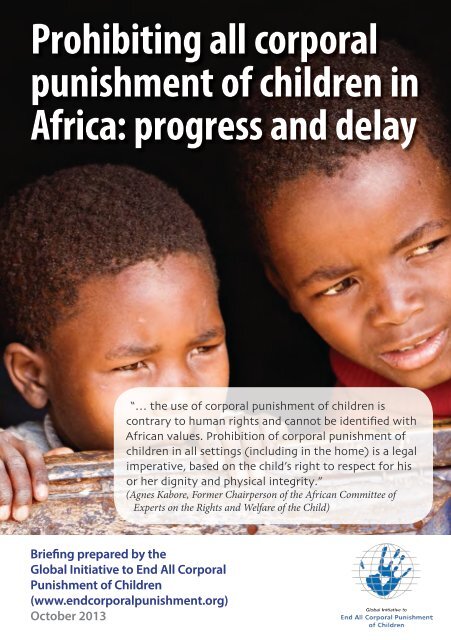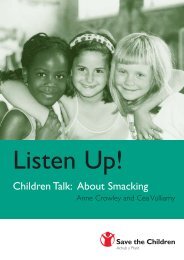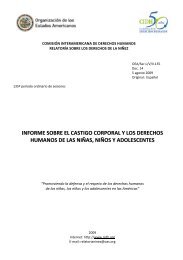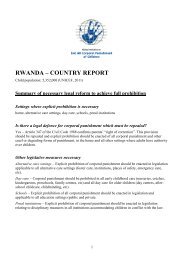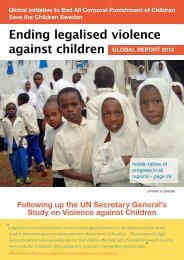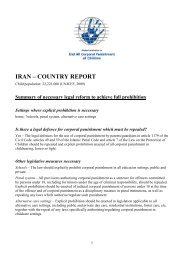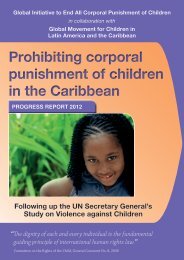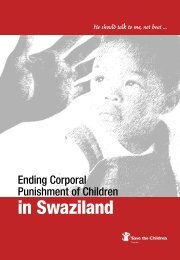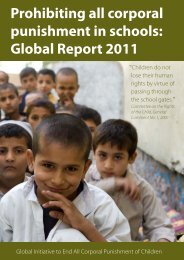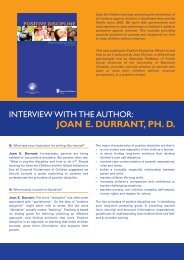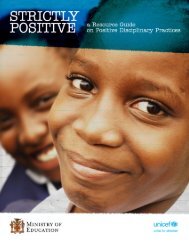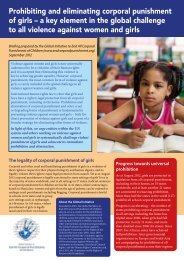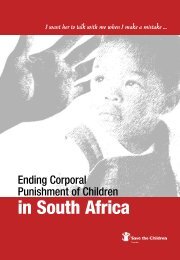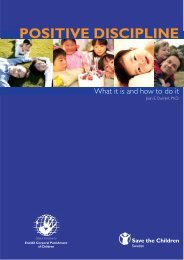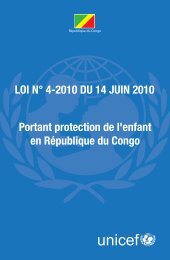English - Global Initiative to End All Corporal Punishment of Children
English - Global Initiative to End All Corporal Punishment of Children
English - Global Initiative to End All Corporal Punishment of Children
You also want an ePaper? Increase the reach of your titles
YUMPU automatically turns print PDFs into web optimized ePapers that Google loves.
Prohibiting all corporal<br />
punishment <strong>of</strong> children in<br />
Africa: progress and delay<br />
“… the use <strong>of</strong> corporal punishment <strong>of</strong> children is<br />
contrary <strong>to</strong> human rights and cannot be identified with<br />
African values. Prohibition <strong>of</strong> corporal punishment <strong>of</strong><br />
children in all settings (including in the home) is a legal<br />
imperative, based on the child’s right <strong>to</strong> respect for his<br />
or her dignity and physical integrity.”<br />
(Agnes Kabore, Former Chairperson <strong>of</strong> the African Committee <strong>of</strong><br />
Experts on the Rights and Welfare <strong>of</strong> the Child)<br />
Briefing prepared by the<br />
<strong>Global</strong> <strong>Initiative</strong> <strong>to</strong> <strong>End</strong> <strong>All</strong> <strong>Corporal</strong><br />
<strong>Punishment</strong> <strong>of</strong> <strong>Children</strong><br />
(www.endcorporalpunishment.org)<br />
Oc<strong>to</strong>ber 2013
PROGRESS<br />
States meeting their obligations<br />
The Committee on the Rights <strong>of</strong> the Child underlines states’<br />
immediate obligation <strong>to</strong> prohibit and eliminate all corporal<br />
punishment in its General Comment No. 8 (2006), which<br />
provides detailed guidance <strong>to</strong> states on fulfilling this obligation.<br />
The Committee has made recommendations concerning<br />
corporal punishment <strong>to</strong> more than 50 states across Africa. Its<br />
recommendations are echoed by other UN human rights treaty<br />
bodies and by the AU human rights mechanisms including the<br />
African Committee <strong>of</strong> Experts on the Rights and Welfare <strong>of</strong> the<br />
Child.<br />
Five African states<br />
have achieved<br />
prohibition in all<br />
settings:<br />
Congo, Republic<br />
Kenya<br />
South Sudan<br />
Togo<br />
Tunisia<br />
During the Universal Periodic Review <strong>of</strong> states’ overall human rights records,<br />
corporal punishment has been raised as an issue in relation <strong>to</strong> most African states.<br />
Recommendations <strong>to</strong> prohibit all corporal punishment <strong>of</strong> children have been accepted by<br />
12 African states.<br />
“There is no right for individuals, and particularly the government <strong>of</strong> a<br />
country <strong>to</strong> apply physical violence <strong>to</strong> individuals for <strong>of</strong>fences. Such a right<br />
would be tantamount <strong>to</strong> sanctioning state sponsored <strong>to</strong>rture under the<br />
Charter [on Human and People’s Rights] and contrary <strong>to</strong> the very nature<br />
<strong>of</strong> this human rights treaty.” (African Commission on Human and People’s Rights,<br />
(2003), Curtis Francis Doebber v Sudan, 236/2000, 33rd Ordinary Session, Niger)<br />
“Progress <strong>to</strong>wards abolishing<br />
corporal punishment is being made,<br />
but millions <strong>of</strong> the world’s children<br />
still suffer from humiliating acts <strong>of</strong><br />
violence and these violations <strong>of</strong> their<br />
rights as human beings can have<br />
serious lifelong effects. Violence<br />
begets violence and we shall reap a<br />
whirlwind. <strong>Children</strong> can be disciplined<br />
without violence that instils fear and<br />
misery.... If we really want a peaceful<br />
and compassionate world, we need<br />
<strong>to</strong> build communities <strong>of</strong> trust where<br />
children are respected, where home<br />
and school are safe places <strong>to</strong> be and<br />
where discipline is taught by example.”<br />
(Archbishop Emeritus Desmond Tutu, 2006)
“<strong>All</strong> States have criminal laws <strong>to</strong> protect citizens from assault. Many have<br />
constitutions and/or legislation reflecting international human rights standards<br />
and article 37 <strong>of</strong> the Convention on the Rights <strong>of</strong> the Child, which uphold<br />
‘everyone’s’ right <strong>to</strong> protection from <strong>to</strong>rture and cruel, inhuman or degrading<br />
treatment or punishment. Many also have specific child protection laws that<br />
make ‘ill-treatment’ or ‘abuse’ or ‘cruelty’ an <strong>of</strong>fence. But ... such legislative<br />
provisions do not generally guarantee the child protection from all corporal<br />
punishment and other cruel or degrading forms <strong>of</strong> punishment.”<br />
(Committee on the Rights <strong>of</strong> the Child, General Comment No. 8, 2006)
DELAY<br />
The worst <strong>of</strong>fenders<br />
The human rights imperative <strong>to</strong> enact<br />
legislation explicitly prohibiting<br />
corporal punishment <strong>of</strong> children,<br />
wherever they are, is clear. But there<br />
are individual governments which<br />
resist reform, ignoring repeated<br />
recommendations by treaty bodies,<br />
rejecting recommendations <strong>to</strong> prohibit<br />
made during the Universal Periodic<br />
Review, even openly defending the<br />
legality and use <strong>of</strong> corporal punishment.<br />
In Further nine states, resources corporal punishment –<br />
caning, flogging, whipping – is lawful as a<br />
sentence for crime under state, religious<br />
and/or traditional systems <strong>of</strong> justice<br />
Botswana, Eritrea, Libya, Mauritania,<br />
Nigeria, Somalia, Swaziland, United<br />
Republic <strong>of</strong> Tanzania, Zimbabwe<br />
25% <strong>of</strong> Africa’s children live in these<br />
states.<br />
In Further eight states, resources corporal punishment is<br />
not fully prohibited in any setting<br />
Botswana, Eritrea, Mauritania, Nigeria,<br />
Somalia, Swaziland, United Republic <strong>of</strong><br />
Tanzania, Zimbabwe<br />
24.5% <strong>of</strong> Africa’s children live in<br />
these states.<br />
The Africa Project <strong>of</strong> the <strong>Global</strong> <strong>Initiative</strong> <strong>to</strong> <strong>End</strong> <strong>All</strong> <strong>Corporal</strong> <strong>Punishment</strong> <strong>of</strong> <strong>Children</strong><br />
aims <strong>to</strong> increase the number <strong>of</strong> states in Africa committed <strong>to</strong> and actively pursuing the<br />
prohibition and elimination <strong>of</strong> all corporal punishment <strong>of</strong> children, in the family, schools<br />
and all other settings. In 2012, following up the UN Secretary General’s Study on Violence<br />
against <strong>Children</strong>, the <strong>Global</strong> <strong>Initiative</strong> <strong>to</strong>gether with Save the <strong>Children</strong> and Plan International<br />
published a progress report on prohibiting corporal punishment <strong>of</strong> children in West Africa.<br />
The project also produces a quarterly African Newsletter. These resources are available<br />
online in <strong>English</strong> and French at www.endcorporalpunishment. For more information, please<br />
contact the project coordina<strong>to</strong>r at: vohi<strong>to</strong>@endcorporalpunishment.org.
The Further UN Committee resources on the Rights <strong>of</strong><br />
the Child has made recommendations<br />
concerning corporal punishment three<br />
times <strong>to</strong> the following states, but they have<br />
not yet achieved prohibition in all settings<br />
Algeria, Ethiopia, Nigeria, Sudan<br />
The Further African resources Committee <strong>of</strong> Experts on<br />
the Rights and Welfare <strong>of</strong> the Child has<br />
made recommendations/observations<br />
concerning corporal punishment <strong>to</strong> the<br />
following states:<br />
Burkina Faso, Egypt, Nigeria, Uganda<br />
Seven states rejected recommendations <strong>to</strong> prohibit<br />
corporal Further punishment resources during the first Universal<br />
Periodic Review <strong>of</strong> their overall human rights record<br />
Botswana, Burkina Faso*, Eritrea, Ethiopia, Sudan,<br />
Swaziland, United Republic <strong>of</strong> Tanzania<br />
*But draft legislation which would achieve prohibition is<br />
under consideration<br />
States defending corporal punishment in the Universal Periodic Review<br />
(extracts from the reports <strong>of</strong> the Working Group):<br />
“The Government … has no plans <strong>to</strong> eliminate corporal punishment, contending<br />
that it is a legitimate and acceptable form <strong>of</strong> punishment, as informed by the<br />
norms <strong>of</strong> the society. It is administered within the strict parameters <strong>of</strong> legislation<br />
in the frame <strong>of</strong> the Cus<strong>to</strong>mary Courts Act, the Penal Code and the Education Act.”<br />
(Botswana)<br />
“The Education Act and its Regulations prescribe a strict framework within which<br />
[caning] is <strong>to</strong> be administered in schools. Therefore caning <strong>of</strong> miscreant students in<br />
schools is viewed as a legitimate and acceptable form <strong>of</strong> punishment in Tanzania.<br />
It was not the intention <strong>of</strong> the law makers that it should be violent, abusive and/or<br />
degrading as recommended or envisaged.”<br />
(United Republic <strong>of</strong> Tanzania)
THE REALITY BEHIND<br />
THE STATISTICS<br />
There is a large and still growing body <strong>of</strong> research<br />
which reveals the appalling levels <strong>of</strong> punitive violence<br />
experienced by children in Africa (for full references see<br />
www.endcorporalpunishment.org):<br />
• UNICEF surveys carried out in nearly<br />
50 countries worldwide between 2005<br />
and 2011 found that high percentages<br />
<strong>of</strong> children had experienced physical<br />
punishment and/or psychological<br />
aggression in the home in the month<br />
prior <strong>to</strong> the survey, including: Algeria<br />
87%, Burkina Faso 83%, Cameroon<br />
93%, Central African Republic<br />
92%, Chad 84%, Côte d’Ivoire 91%,<br />
Democratic Republic <strong>of</strong> the Congo<br />
92%, Djibouti 72%, Gambia 90%,<br />
Ghana 94%, Guinea-Bissau 82%,<br />
Kenya 77%, Liberia 94%, Morocco<br />
91%, Nigeria 91%, Sierra Leone 82%,<br />
Swaziland 89%, Togo 93%.<br />
• In addition <strong>to</strong> being hit with hands<br />
or objects, children also experience a<br />
wide range <strong>of</strong> other violent, cruel and<br />
degrading treatment. For example,<br />
research in Uganda found that children<br />
were punished by being pinched,<br />
forced <strong>to</strong> do hard work, locked up, tied<br />
up and burned.<br />
• Where school corporal punishment<br />
remains legally sanctioned, and even<br />
where it is unlawful, in many cases<br />
it is widespread. The proportion <strong>of</strong><br />
school students who have experienced<br />
physical punishments such as beating<br />
is alarmingly high in many African<br />
states (92% in Botswana, 70% in<br />
Malawi, 87% in Morocco).<br />
The available evidence paints a horrific picture – but given that much <strong>of</strong> the research relies<br />
on reporting by adults it is certain that children’s actual experience is worse. <strong>Children</strong><br />
especially vulnerable <strong>to</strong> corporal punishment, such as very young children, disabled<br />
children and working children, are among the<br />
least likely <strong>to</strong> be visible in research.<br />
“<strong>Children</strong> are sick <strong>of</strong> being<br />
called ‘the future’; they want<br />
<strong>to</strong> enjoy their childhood,<br />
free <strong>of</strong> violence, now.”<br />
(Paulo Sérgio Pinheiro,<br />
Independent Expert who led the<br />
UN Secretary General’s Study on<br />
Violence against <strong>Children</strong>)<br />
Inquiries by the <strong>Global</strong> <strong>Initiative</strong> suggest<br />
that in 11 African states there is no research<br />
in<strong>to</strong> corporal punishment <strong>of</strong> children; and very<br />
minimal research recorded in a further seven. But<br />
we know more than enough <strong>to</strong> demand urgent<br />
action in Africa. <strong>Children</strong> cannot wait for the<br />
fulfilment <strong>of</strong> their right <strong>to</strong> protection from all<br />
violence. Universal prohibition and elimination <strong>of</strong><br />
all corporal punishment is needed now.
TAKING ACTION<br />
Some African states have acknowledged the need<br />
for law reform <strong>to</strong> prohibit corporal punishment in<br />
all settings including in the home. Only four states<br />
are actively considering draft legislation which<br />
would achieve this. Other states are considering<br />
prohibiting corporal punishment in one or more<br />
settings outside the home.<br />
Yet there are immediate opportunities for<br />
law reform in a great many more African states –<br />
around 40 across the region – as laws relevant <strong>to</strong><br />
children are being reviewed and revised.<br />
There are active regional campaigns promoting prohibition <strong>of</strong> all corporal punishment<br />
<strong>of</strong> children. In Africa, following a consultation on ending corporal punishment <strong>of</strong><br />
children held in Ouagadougou, Burkina Faso in March 2011, a Strategic Plan <strong>to</strong> accelerate<br />
the prohibition and elimination <strong>of</strong> corporal punishment <strong>of</strong> children across Africa was<br />
developed and endorsed by international, Pan African and African organisations.<br />
“Article 15 <strong>of</strong> the Constitution is<br />
couched in very clear and unambiguous<br />
language, that no person shall be<br />
subjected <strong>to</strong> <strong>to</strong>rture, or <strong>to</strong> inhuman<br />
or degrading punishment or other like<br />
treatment.… the provisions <strong>of</strong> sections<br />
24(c) and 27 <strong>of</strong> the Penal Code, which<br />
permit the infliction or imposition <strong>of</strong><br />
corporal punishment on <strong>of</strong>fenders, are<br />
in <strong>to</strong>tal contravention, and conflict<br />
with the above provisions <strong>of</strong> article 15<br />
<strong>of</strong> the Constitution.”<br />
(High Court, Zambia, 1999)<br />
“… at this time, so close <strong>to</strong> the dawn <strong>of</strong><br />
the 21st century, juvenile whipping is<br />
cruel, it is inhuman and it is degrading.”<br />
(Constitutional Court, South Africa, 1995)<br />
“… it would [not] be appropriate <strong>to</strong><br />
allow corporal punishment which is<br />
unconstitutional <strong>to</strong> continue <strong>to</strong> be<br />
inflicted until Parliament makes the<br />
necessary amendments.”<br />
(Supreme Court, Namibia, 1991)<br />
Law reform <strong>to</strong> prohibit corporal<br />
punishment means:<br />
• repealing all legal defences,<br />
justifications, authorisations<br />
and regulations for the use <strong>of</strong><br />
corporal punishment<br />
• enacting explicit prohibition<br />
<strong>of</strong> all corporal punishment<br />
and other cruel and<br />
degrading forms <strong>of</strong><br />
punishment in all settings<br />
Where progress is not being made,<br />
stronger advocacy is now required,<br />
including legal advocacy. Full use should<br />
be made <strong>of</strong> Constitutional challenges<br />
<strong>to</strong> corporal punishment and direct<br />
application <strong>of</strong> the Convention on the<br />
Rights <strong>of</strong> the Child and other relevant<br />
instruments in national courts. There<br />
are many examples <strong>of</strong> national high<br />
level court judgments which have led <strong>to</strong><br />
law reform in Africa. Recourse can also<br />
be made <strong>to</strong> African and international<br />
complaints/communications mechanisms,<br />
where a state has accepted these. The<br />
<strong>Global</strong> <strong>Initiative</strong> is currently preparing<br />
reports <strong>to</strong> support legal action in those<br />
states which continue <strong>to</strong> resist prohibition.<br />
For further information and advice<br />
on any aspect <strong>of</strong> this briefing, see<br />
www.endcorporalpunishment.org or email<br />
vohi<strong>to</strong>@endcorporalpunishment.org<br />
Sign up <strong>to</strong> the <strong>Global</strong> <strong>Initiative</strong><br />
Africa Newsletter by emailing:<br />
vohi<strong>to</strong>@endcorporalpunishment.org<br />
Subscribe <strong>to</strong> RSS alerts on latest<br />
developments and updated country reports at<br />
www.endcorporalpunishment.org
Compliance with international human rights law – the Convention on the Rights <strong>of</strong><br />
the Child and other human rights instruments – requires that states prohibit by<br />
law all corporal punishment <strong>of</strong> children in all settings, including the home.<br />
There has been accelerating progress <strong>to</strong>wards law reform in Africa as in other regions,<br />
but the pace <strong>of</strong> reform is still slow. Too many governments on the one hand claim <strong>to</strong><br />
support ending all forms <strong>of</strong> violence against children while on the other they fail <strong>to</strong><br />
prohibit violence disguised as discipline or punishment. Some governments claim <strong>to</strong> have<br />
prohibited corporal punishment but scrutiny <strong>of</strong> the laws shows otherwise.<br />
Worldwide, 33 states have prohibited corporal punishment in all settings, including<br />
the home – but 25 do not prohibit it fully in any setting. Prohibition has been achieved<br />
in schools in 122 states, in penal institutions in 123, in alternative care settings and in<br />
day care in 40 and as a sentence for crime in 158. In Africa, complete prohibition has<br />
been enacted in five states, prohibition in all schools in 25 states, in penal institutions<br />
in 26 and in<br />
alternative care<br />
and day care<br />
in six; corporal<br />
punishment is<br />
unlawful as a<br />
sentence <strong>of</strong> the<br />
courts in 46<br />
African states.<br />
<strong>Global</strong>ly, only<br />
5.2% <strong>of</strong> children<br />
live in countries<br />
where they are<br />
protected in law<br />
from punitive<br />
assault by adults;<br />
7.9% <strong>of</strong> children<br />
in Africa enjoy<br />
this protection.<br />
“Physical punishment at home, at school, in the street or in other institutions<br />
is prohibited with respect <strong>to</strong> the child … corporal punishment means any<br />
physical punishment inflicted on children by parents, teachers and others….”<br />
(Article 220, Burkinabe Draft Child Protection Code, June 2013)<br />
“Extensive research was done during the review <strong>of</strong> the Child Care Act on corporal<br />
punishment, and the DSD [Department <strong>of</strong> Social Development] strongly supports<br />
the abolishment <strong>of</strong> corporal punishment in all settings….”<br />
(South African Department <strong>of</strong> Social Development, 2012)


